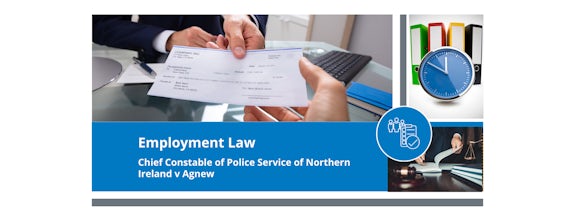
May 27, 2025

The long-awaited decision of the Supreme Court decision in the Chief Constable of Police Service of Northern Ireland v Agnew case has finally been published.
The case is an important development in the UK law relating to deductions of holiday pay.
As you may recall, the main question to which employers and employment lawyers have been awaiting the answer was –
The Claimants were police officers and civilian staff working for the PSNI in Northern Ireland who brought claims for underpayment of holiday pay after having historically received basic pay only during periods of annual leave.
Both sides agreed in the preliminary stages of the case that there had been an underpayment on the basis that holiday pay should have been calculated to include periods of compulsory overtime.
The issue before the Supreme Court was how far back could Claimants go with their claims for unpaid holiday leave.
The relevant Northern Irish statute (which mirrors the Employment Rights Act 1996) was clear stating that a claim could only be made in respect of a payment made in the period three months immediately before the claim was brought, unless the deduction was part of a series of deductions, in which case the deductions could be linked together provided that the claim was brought within three months of the most recent of the series of deductions.
In the landmark Scottish case, Bear Scotland v Fulton, the EAT had previously concluded that deductions could only be linked as part of a “series of deductions” if there was a gap of three months or less between each individual deduction.
Supreme Court Decision
The Supreme Court in Agnew has now held that;
The Supreme Court decided that whether a claim in respect of two or more deductions constitutes a claim in respect of a “series” of deductions is a question of fact.
In order to accurately assess the position, employers must now consider all relevant circumstances in relation to the deductions in issue, including:
The fundamental change for employers is that the question of whether the individual deductions were more or less than three months apart is no longer relevant.
This decision of the Supreme Court will create a liability for many employers which did not previously exist.
The impact of the Agnew judgment is mitigated, for now, by the fact that claims for unlawful deductions from wages under the Employment Rights Act 1996 can only consider deductions over a maximum period of two years
It has been suggested by employment lawyers that the 2 year backstop is vulnerable to potential challenge – however, in the meantime, the potential risk to employers relates to historic deductions during the past 2 years
We recommend that employers take two actions
Consider if any, historic claims for deductions of holiday pay can now be made by employees and take legal advice as to the strategy for dealing with the claims
Take legal advice as to how to ensure that your business is calculating holiday pay in the correct manner to avoid future claims
If you would like to discuss the information outlined in this blog post, please get in touch with Stuart Robertson by email or by phone at +(0) 7793 821 523.

Stuart attended The High School of Glasgow and studied law at the University of Strathclyde. He qualified as a solicitor in 1991 and has been a partner in three leading commercial legal firms in Edinburgh Glasgow and Aberdeen during his legal career.